Related Research Articles
Naomi J. Halas is the Stanley C. Moore Professor in Electrical and Computer Engineering, and professor of biomedical engineering, chemistry, and physics at Rice University. She is also the founding director of Rice University Laboratory for Nanophotonics, and the Smalley-Curl Institute. She invented the first nanoparticle with tunable plasmonic resonances, which are controlled by their shape and structure, and has won numerous awards for her pioneering work in the field of nanophotonics and plasmonics. She was also part of a team that developed the first dark pulse soliton in 1987 while working for IBM.
Xi-Cheng Zhang is a Chinese-born American physicist, currently serving as the Parker Givens Chair of Optics at the University of Rochester, and the director of the Institute of Optics. He is also the Chairman of the Board and President of Zomega Terahertz Corporation.
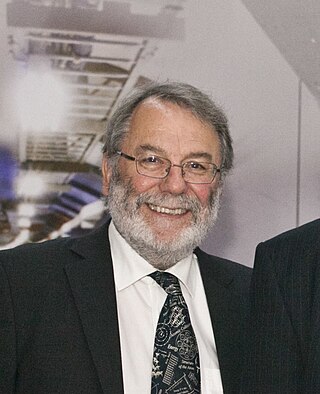
Sir Peter Leonard Knight is a British physicist, professor of quantum optics and senior research investigator at Imperial College London, and principal of the Kavli Royal Society International Centre. He is a leading academic in the field of quantum optics and is the recipient of several major awards including the Royal Medal from the Royal Society and the Thomas Young Medal and Prize from the Institute of Physics. He is a former president of the Institute of Physics and Optica, the first non North American-based person to take the position.
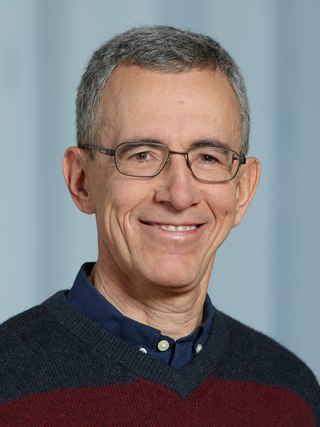
Ataç İmamoğlu is a Turkish-Swiss physicist working on quantum optics and quantum computation. His academic interests are quantum optics, semiconductor physics, and nonlinear optics.

Robert Louis Byer is a physicist. He was president of the Optical Society of America in 1994 and of the American Physical Society in 2012.

Anthony Michael Johnson is an American experimental physicist, a professor of physics, and a professor of computer science and electrical engineering at the University of Maryland, Baltimore County (UMBC). He is the director of the Center for Advanced Studies in Photonics Research (CASPR), also situated on campus at UMBC. Since his election to the 2002 term as president of the Optical Society, formerly the Optical Society of America, Johnson has the distinction of being the first and only African-American president to date. Johnson's research interests include the ultrafast photophysics and nonlinear optical properties of bulk, nanostructured, and quantum well semiconductor structures, ultrashort pulse propagation in fibers and high-speed lightwave systems. His research has helped to better understand processes that occur in ultrafast time frames of 1 quadrillionth of a second. Ultrashort pulses of light have been used to address technical and logistical challenges in medicine, telecommunications, homeland security, and have many other applications that enhance contemporary life.
Girish S. Agarwal, Fellow of the Royal Society UK, is a theoretical physicist. He is currently at the Texas A & M University with affiliations to the Departments of Biological and Agricultural Engineering, Physics and Astronomy, and the Institute for Quantum Science and Engineering. Earlier he worked as Noble Foundation Chair and the Regents Professor at the Oklahoma State University. He is a recognized leader in the field of quantum optics and also has made major contributions to the fields of nonlinear optics, nanophotonics and plasmonics. In 2013 he published the textbook "Quantum Optics", covering a wide range of recent developments in the field, which has been well received by the community.

Amnon Yariv is an Israeli-American professor of applied physics and electrical engineering at Caltech, known for innovations in optoelectronics. Yariv obtained his B.S., M.S. and PhD. in electrical engineering from University of California, Berkeley in 1954, 1956 and 1958, respectively.

Robert William Boyd is an American physicist noted for his work in optical physics and especially in nonlinear optics. He is currently the Canada Excellence Research Chair Laureate in Quantum Nonlinear Optics based at the University of Ottawa, professor of physics cross-appointed to the school of electrical engineering and computer science at the University of Ottawa, and professor of optics and professor of physics at the University of Rochester.
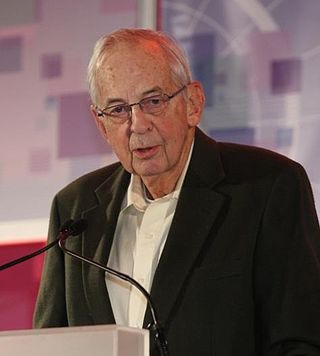
James Power Gordon was an American physicist known for his work in the fields of optics and quantum electronics. His contributions include the design, analysis and construction of the first maser in 1954 as a doctoral student at Columbia University under the supervision of C. H. Townes, development of the quantal equivalent of Shannon's information capacity formula in 1962, development of the theory for the diffusion of atoms in an optical trap in 1980, and the discovery of what is now known as the Gordon-Haus effect in soliton transmission, together with H. A. Haus in 1986. Gordon was a member of the National Academy of Engineering and the National Academy of Sciences.
Andrea Alù is an Italian American scientist and engineer, currently Einstein Professor of Physics at The City University of New York Graduate Center. He is known for his contributions to the fields of optics, photonics, plasmonics, and acoustics, most notably in the context of metamaterials and metasurfaces. He has co-authored over 650 journal papers and 35 book chapters, and he holds 11 U.S. patents.
Jelena Vučković is a Serbian-born American professor and a courtesy faculty member in the Department of Applied Physics at Stanford University. She served as Fortinet Founders Chair of the Department of Electrical Engineering at Stanford University from August 2021 through June 2023. Vučković leads the Nanoscale and Quantum Photonics (NQP) Lab, and is a faculty member of the Ginzton Lab, PULSE Institute, SIMES Institute, and Bio-X at Stanford. She was the inaugural director of the Q-FARM initiative. She is a Member of the National Academy of Sciences, and a Fellow of The Optical Society, the American Physical Society and the Institute of Electrical and Electronics Engineers.
Susanne F. Yelin is a German physicist specializing in theoretical quantum optics and known for her work in quantum coherence and superradiance. She is a professor of physics at the University of Connecticut, a professor of physics in residence at Harvard University, and vice director of the Max Planck/Harvard Research Center for Quantum Optics.

Herbert Graves Winful is a Ghanaian-American engineering professor, whose honours include in 2020 the Quantum Electronics Award. He is the Joseph E. and Anne P. Rowe Professor of Electrical Engineering, Arthur F. Thurnau Professor of Electrical Engineering and Computer Science, and a Professor of Physics at the University of Michigan.
Alexander Luis Gaeta is an American physicist and the David M. Rickey Professor of Applied Physics at Columbia University. He is known for his work on quantum and nonlinear photonics. He is a Fellow of the American Physical Society, Optica, and of the Institute of Electrical and Electronics Engineers.
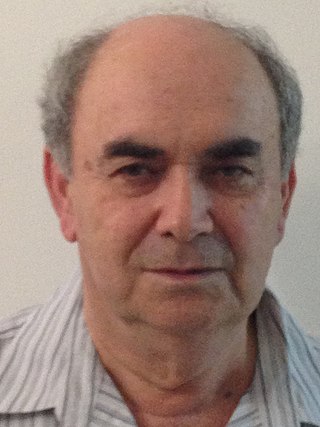
Baruch Fischer is an Israeli optical physicist and Professor Emeritus in the Andrew and Erna Viterbi Faculty of Electrical and Computer Engineering of the Technion, where he was the Max Knoll Chair in Electro-Optics and Electronics.
Kimani Christopher Toussaint, Jr. is an American engineer who is a professor and senior associate dean in the School of Engineering at Brown University. His research considers the development of quantitative nonlinear optical imaging methods and advanced optical techniques for nanotechnology, and the characterization of plasmonic nanostructure. He is a Fellow of Optica.
Dirk Robert Englund is an Associate Professor of Electrical Engineering and Computer Science at the Massachusetts Institute of Technology. He is known for his research in quantum photonics and optical computing.
Demetrios N. Christodoulides is a United States physicist known for his work in quantum optics and nonlinear optics and photonics. He is currently the Steven and Kathryn Sample Chair in Engineering, and Professor of Electrical and Computer Engineering at the University of Southern California.
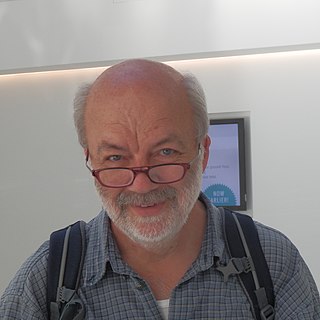
Gerhard "Gerd" Leuchs is a German experimental physicist in optics. He is the Director Emeritus at the Max Planck Institute for the Science of Light and an adjunct professor in the physics department at the University of Ottawa. From 1994-2019 he was a full professor of physics and since 2019 has been a senior professor at Friedrich-Alexander University Erlangen-Nürnberg (FAU).
References
- ↑ American Men and Women of Science, Thomson Gale 2004
- ↑ "Alexander E. Kaplan Obituary". Beth Israel Memorial Chapel. Retrieved 2020-01-05.
- ↑ "Alexander Kaplan retires from ECE". Department of Electrical and Computer Engineering. Retrieved 2023-11-26.
- 1 2 "Alexander Kaplan remembered as passionate scientist and excellent educator". Department of Electrical and Computer Engineering. 2020-01-16. Retrieved 2023-11-26.
- 1 2 3 "Alexander E Kaplan | Optica". www.optica.org. Retrieved 2023-11-26.